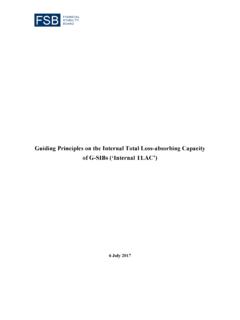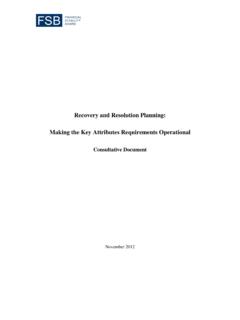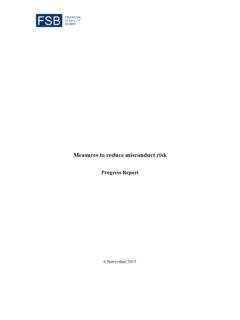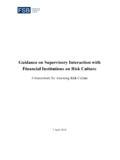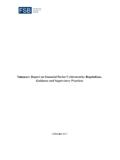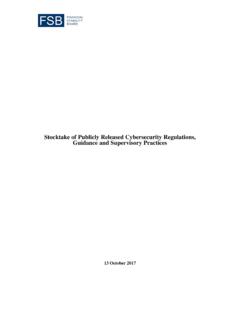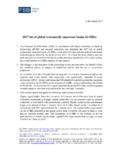Transcription of Supervisory and Regulatory Issues that Merit Authorities ...
1 Financial Stability Implications from FinTech Supervisory and Regulatory Issues that Merit Authorities attention 27 June 2017 The Financial Stability Board (FSB) is established to coordinate at the international level the work of national financial Authorities and international standard-setting bodies in order to develop and promote the implementation of effective Regulatory , Supervisory and other financial sector policies. Its mandate is set out in the FSB Charter, which governs the policymaking and related activities of the FSB.
2 These activities, including any decisions reached in their context, shall not be binding or give rise to any legal rights or obligations under the FSB s Articles of Association. Copyright Financial Stability Board Contacting the Financial Stability Board Sign up for e-mail alerts: Follow the FSB on Twitter: @FinStbBoard E-mail the FSB at: Table of Contents Page Executive Summary .. 1 1. Introduction .. 6 2. The Framework for analysis .. 7 The scope of FinTech activities covered .. 7 Common drivers of FinTech innovations.
3 10 The benefits and risks considered .. 12 Potential to support financial stability .. 13 Potential to undermine financial stability .. 13 3. Why FinTech is worth looking at from a financial stability perspective .. 15 Potential benefits for financial stability .. 16 Potential to undermine financial stability .. 17 Key insights on balancing financial stability implications .. 21 4. Supervisory and Regulatory approaches to FinTech .. 23 How FinTech fits into current Regulatory frameworks .. 24 Challenges to monitoring FinTech activities.
4 27 5. FinTech Issues that Merit Authorities attention .. 29 Other Issues that may Merit Authorities attention .. 31 Ongoing monitoring of FinTech .. 32 Glossary .. 33 Annex A Common drivers of FinTech innovations .. 35 Annex B Case study on retail payments and digital wallets .. 38 Annex C Case study on FinTech credit .. 40 Annex D Case study on robo-advisors .. 43 Annex E Case study on DLT-based wholesale payment systems .. 47 Annex F Case study on private digital currencies .. 52 Annex G Case study on AI and machine learning.
5 55 Annex H Stocktake of Regulatory approaches to FinTech .. 57 Annex I Members of the FSB FinTech Issues Group .. 60 iv 1 Supervisory and Regulatory Issues Raised by FinTech that Merit Authorities attention Executive Summary Technology-enabled innovation in financial services (FinTech) is developing rapidly. With its emergence, there will be both opportunities and risks to financial stability that policymakers, regulators, supervisors and overseers should consider. This is particularly important as many innovations have not yet been tested through a full financial cycle, and decisions taken in this early stage may set important precedents.
6 Policymakers should continue to assess the adequacy of their Regulatory frameworks as adoption of FinTech increases, with the objective of harnessing the benefits while mitigating risks. In this regard, the German G20 Presidency, as part of its focus on digitalisation, has suggested that the Financial Stability Board (FSB) build on the monitoring to date and identify Supervisory and Regulatory Issues of FinTech that Merit Authorities attention from a financial stability perspective. Currently, any assessment of the financial stability implications of FinTech is challenging given the limited availability of official and privately disclosed data.
7 It will be important to take into account materiality and risks in evaluating new areas. It will also be important to understand how business models of start-ups and incumbents, and the market structure, are changing. To draw out the Supervisory and Regulatory Issues of FinTech, the FSB developed a framework that defines the scope of FinTech activities and identifies the potential benefits and risks to financial stability. It provides a basis on which future analysis and monitoring can be made. As most FinTech activities are currently small compared to the overall financial system, the analysis focuses on conceivable benefits and risks.
8 Nonetheless, international bodies and national Authorities should consider taking FinTech into account in their existing risk assessments and Regulatory frameworks in light of its rapid evolution. Indeed, many Authorities have already made Regulatory changes to adapt to FinTech activities. There are clear benefits to greater international cooperation given the commonalities and global dimension of many FinTech activities. Increased cooperation will be particularly important to mitigate the risk of fragmentation or divergence in Regulatory frameworks, which could impede the development and diffusion of beneficial innovations in financial services, and limit the effectiveness of efforts to promote financial stability.
9 Drawing on the findings of the literature, discussions with academics and industry participants, and a stocktake of Regulatory approaches to FinTech, the FSB concludes that there are currently no compelling financial stability risks from emerging FinTech innovations. The analysis identifies, however, 10 Issues that Merit Authorities attention , of which three are seen as priorities for international collaboration. Addressing these priority areas is seen as important to promoting financial stability, fostering responsible innovation and preventing any derailment of Authorities efforts to achieve a more inclusive financial system.
10 Although many of these Issues are not new, they may be accentuated given the speed of growth of FinTech, new forms of interconnectedness, and increased dependencies on third-party service providers. All of the Issues identified are building blocks for ensuring a strong, sustainable and resilient financial system as innovations in financial services evolve and are 2 adopted. The FSB will continue to monitor and discuss the evolution of the financial stability implications of FinTech developments going forward.
